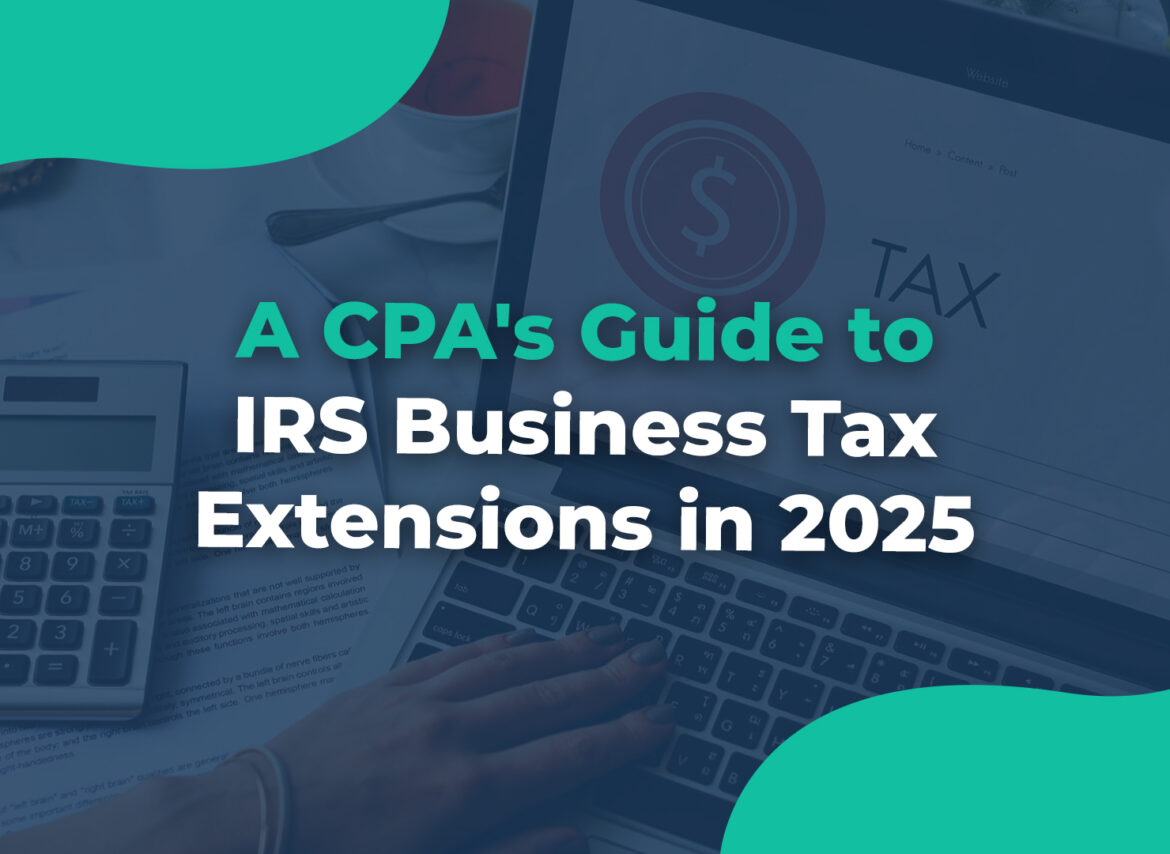Tax season often pushes even the most organized CPA firms to their limits. As deadlines approach, workloads soar, client records might be incomplete, and the stakes are high. One valuable tool to help manage these challenges is the IRS business Tax Extensions, which allows additional time to file returns accurately without incurring late filing penalties.
But extensions do come with limitations and responsibilities. Here’s how CPAs can leverage tax extensions to maintain compliance, reduce stress, and meet client needs effectively.
A CPA’s Guide to IRS Business Tax Extensions in 2025
Understanding IRS Business Tax Extensions
An IRS business tax extension isn’t just a filing delay; it’s a strategic decision that provides companies more time to submit complete and accurate tax documents. It’s particularly helpful for businesses needing extra time for detailed financial reporting. However, it’s critical to remember that this extension only applies to filing deadlines. Taxes owed must still be estimated and paid by the original due date, or penalties and interest will accrue—potentially adding a heavy financial burden.
Key Extension Forms and Deadlines for 2025
Filing deadlines and extension options depend on the type of business entity. Here’s a breakdown of common forms and deadlines:
- Sole Proprietors and Single-Member LLCs: Typically, individual federal income tax returns are due on April 15. Filing Form 4868 provides an automatic extension to October 15.
- Partnerships and S-Corporations: For these entities, the filing deadline is March 15. Filing Form 7004 grants a six-month extension to September 15.
- C-Corporations: Generally, C-corporations follow the same April 15 deadline as individual filers. By filing Form 7004, they can extend this deadline to October 15. Companies with different fiscal years should verify their specific deadlines.
While extensions give breathing room for filing, tax payments must be made on time. Misestimating or neglecting these payments can lead to substantial penalties and interest charges, impacting a business’s cash flow and overall financial health.
Risks of Missing Tax Deadlines
Missing tax deadlines can lead to various complications, including late payment penalties and accumulating interest. Frequent delays may even result in more severe IRS penalties, which can disrupt cash flow and damage a company’s financial stability. For CPA firms, ensuring timely filings for clients is essential to maintain trust and compliance.
Strategies for Managing Tax Payments
For businesses struggling to pay the full tax amount on time, the IRS offers relief options like installment agreements and offers in compromise. These options allow businesses to either pay in smaller increments or potentially settle for a lesser amount under certain conditions. This flexibility can provide a manageable solution for companies under financial strain, allowing them to meet tax obligations gradually.
Utilizing Tax Extensions in Times of Disaster
During natural disasters or other major disruptions, the IRS often provides additional relief, including extended filing and payment deadlines. These measures allow businesses in affected areas to prioritize recovery efforts while receiving crucial tax deadline flexibility, reducing immediate financial pressures.
Professional Assistance: Streamlining the Tax Extension Process
Managing tax extensions accurately and efficiently can be complex. This is where professional support can be invaluable. An experienced CPA team can handle everything from the correct form selection to precise tax estimations, ensuring clients fully benefit from the extension while minimizing the risk of penalties. Professional guidance helps avoid common mistakes, like incorrect EINs or missed deadlines, that could lead to unnecessary complications.
Challenges in High Workloads Leading to Filing Errors
Tax season often means long hours and intense schedules for CPAs. The risk of errors—including missing forms, miscalculations, or overlooked details—rises as deadlines approach. Even minor mistakes can cause delays or lead to penalties for clients, impacting trust and client relationships. Here, outsourcing non-core, repetitive tasks, like tax extension filings, can be a game-changer. By allowing specialized teams to handle routine compliance work, CPA firms can focus on high-value activities, like tax planning and client advisory services.
The Importance of Accuracy in Tax Extensions
A tax extension may seem simple, but small details matter. Errors like mismatched EINs or incorrect payment amounts can delay approval and result in penalties. For CPAs, meticulous attention to detail in extension filings is essential for maintaining client satisfaction and reducing the need for rework. Outsourcing can help reduce these risks by delegating routine, high-volume tasks to experienced professionals who ensure every detail is correct.
How Outsourcing Reduces Tax Season Stress
Many CPA firms are turning to outsourcing during peak season to balance quality with efficiency. This approach offers several benefits:
- Accurate, On-Time Submissions: Specialized teams prepare and file extensions accurately, reducing errors.
- Administrative Efficiency: Freeing up in-house teams allows them to focus on advisory and client interaction.
- Scalability: Outsourcing partners can scale quickly to handle high volumes during tax season.
- Reduced Burnout: Delegating repetitive tasks reduces team stress and improves overall productivity.
IRS business Tax Extensions – Common Filing Mistakes to Avoid
Avoiding common errors can help CPA firms streamline their tax extension processes:
- Missing the Deadline: Extensions are only valid if filed by the original deadline.
- Incomplete Information: Ensure all information, from EINs to payment amounts, is accurate.
- Ignoring Payments: Taxes owed must still be paid by the original deadline, even if the filing is extended.
- Frequent Extensions: Regularly extending deadlines without necessity may attract IRS scrutiny.
Tax extensions are essential for CPA firms, enabling clients to meet compliance requirements without the stress of last-minute filings. By ensuring accurate filings, meeting deadlines, and incorporating outsourcing into their workflows, CPA firms can navigate tax season with greater ease. Outsourcing routine tasks like extension filings allows CPAs to focus on high-value advisory services, minimize errors, and maintain client satisfaction, ultimately enhancing efficiency and reducing burnout during peak periods.
Make sure your business stays compliant and accurate with TMG Pitchers tailored solutions for IRS Business Tax Extensions in 2025.






